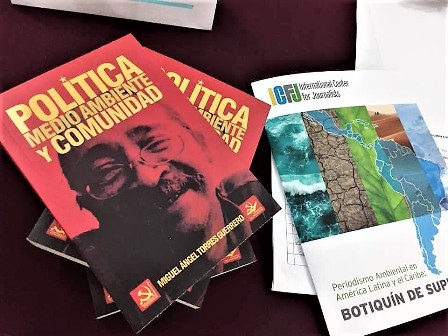Two new books by Melóncoyote editors now available
In tribute to Miguel Ángel Torres Guerrero, co-founder of Journalism to Raise Environmental Awareness (PECE) and the Mexican Network of Environmental Journalists (Rempa), colleagues held posthumous presentations in October and November 2019 of his new books Política, ambiente y sociedad (Politics, Environment and Society) and Periodismo Ambiental en América Latina y el Caribe: Botiquín de superación (Environmental Journalism in Latin America and the Caribbean: Toolkit for Success).
In Mexico City at the Centro Nacional de Comunicación Social A.C. (Cencos), Marcos Leonel Posadas Segura, editor of Ediciones del Movimiento, pronounced the dedication to Política, ambiente y sociedad, a 450-page work produced by this publisher.
Posadas Segura pointed out that the volume is a compilation of Torres Guerrero’s political analysis columns that had appeared weekly for the past three years in the magazine Tribuna Comunista.
At another book presentation in the city of Aguascalientes during the 100th anniversary celebration of the evolution of the Mexican communist movement, Marco Vinicio Saldaña Valero, colleague and political friend of both Torres Guerrero and Posadas Segura, announced that this is the first the books the publishing house hopes to print.
Financing and promoting the book, Daniel Carlos García Gómez, member of the editorial board in charge of its production, fulfilled a promise to his friend, the author, to publish the collection.
Rempa organized the presentation at Cencos, as well as another event at the Casa Refugio Citlaltépetl cultural center in Mexico City, honoring Torres Guerrero also for his role as editor in Periodismo Ambiental en América Latina y el Caribe: Botiquín de superación, authored by Rempa and PECE co-founder Talli Nauman.
The members of Rempa provided refreshments for both free events and were grateful to those who attended. They emphasized that this book goes beyond a simple manual on environmental news coverage.
“This handbook and practice guide is sponsored by the International Center for Journalists, headquartered in Washington, D.C. and was developed with contributions from professionals throughout Ibero-America,” they announced.
A few quotes translated from its 34 pages:
Environmental journalism has a very important function: Since it provides daily coverage on predation of habitat; dispossession of lands; appropriation of water, soil, wind, seeds, the sun and all, as well as on the violence caused by extractivism, it reveals the cracks in the foundation of the current economic system, making way for improvements to come at some later stage.
Environmental journalists’ task is to make known the perspectives of communities underserved in the mass media regarding solutions, alternatives and proposals to the problems the dominant development paradigm causes them.
In general, these proposals are culturally acceptable, socially agreed upon and economically viable—requirements that make possible the sustainability of the communities. That’s why both a diagnosis of the problems and opportunities that concern us, as well as a discussion on the practices and methods that will lead to professional success, are of utmost importance.
This short book provides a long look at environmental journalism’s history and its 21st Century challenges. Likewise, it offers up case studies as examples, highlighting the use of digital and geospatial tools. It spells out some of the best skills to hone and shares useful resources for those who are sincere about covering the beat.
It contrasts the increase in threats to journalists and nature, as well as to defenders of natural resources and land rights, with the uptick in promising trends for the field of environmental journalism in the hemisphere.
Specifically, it concludes, application of the Regional Agreement on Access to Information, Public Participation and Justice in Environmental Matters in Latin America and the Caribbean, recently signed in Escazú, Costa Rica, will lead to guarantees of protection for the ranks in the profession, as well as promoting the profession.

